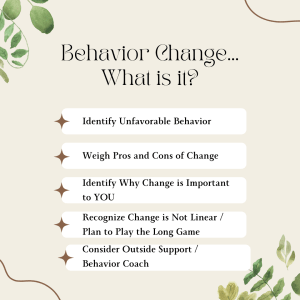
We have heard it time and time again, especially at the start of a new year. People will say "I want to quit smoking," or "I am going to lose weight this year and get in better shape." Smoking for example is a human behavior. These behaviors can have direct negative or positive influences on human health, thereby impacting happiness and life satisfaction. Smoking negatively influences health. Therefore, people see smoking as a behavior that needs to be changed or it will drastically make their overall life satisfaction much lower than someone who does not smoke.
Being overweight is not a behavior, however, there are behaviors that lead to weight gain and cause all sorts of physiological and psychological health issues. Behaviors that hinder or negatively influence our happiness, are usually popular reasons for behavior change The key to behavior change is to make life just a little (or sometimes a lot) less complicated, thereby increasing overall happiness and life satisfaction.
Different reasons or motives will push people to contemplate why they should change their behavior. Usually after the person has thought about it for a while and experienced the negative repercussions of their behavior over a period of time, they will start to weigh pros and cons of engaging in said behavior. This part of behavior change can be very mind opening for most people. Although they might know that a poor diet and sedentary lifestyle or not good behaviors, they may have never sat down to fully think about the consequences until is is too late and they are already dealing with health issues. Research and education are also key at this point to clearly understand why these behaviors are unhealthy. After learning more, the person now sees their behaviors as a problem and establishes why is is important to them to change these behaviors.
The reasons why people will change their behaviors will vary from person to person, but these reasons why they want to change are the key to the next two steps in behavior change... acting on it and maintaining it! The more the person sees and understands value in changing unhealthy behaviors the more likely they are to not only act on it, but sustain those actions over time. Temporary behavior change will only bring temporary results. Those looking for a quick fix will only be let down. Playing the long game and understand that it is a change in lifestyle will help new behaviors to stick, thereby positively impacting overall happiness even in the toughest of times.
It is vital to understand that behavior change often is not linear. Oftentimes people will cycle back and forth. They will do really well for a while, then they lose track for various reasons or life roles and circumstances. As humans we are not perfect and cannot expect to be. So being able to bounce back into a good routine after something throws us off is very important. Each person's why or reason for putting effort into this behavior change is the most important at this point. The more it means to you, the more likely you will do it or get back to doing it.
It may seem simple, but behaviors or habits we have spent our whole lives creating can be very difficult and time consuming to change. That is why most people give up before even trying or continue to live their lifestyle no matter how much it decreases their satisfaction with life. To learn all the little ins-and-outs of behavior change and to make it as simple as possible, using an educated and certified behavior coach is an option. Having outside support will tremendously help with accountability and simplifying things that are overwhelming.
The perfect time for behavior change to occur is simply when the person is ready. If the person is not ready and does not find value in changing a behavior, then the behavior will persist. We have all head the saying "actions speak louder than words." A person can say they are ready, but until they start acting it is all just talk. For behavior change to be successful, one must not only talk the talk, but walk the walk.
-Caleb Campbell-
Masters in Kinesiology
Certified Personal Trainer- NASM, BCS



